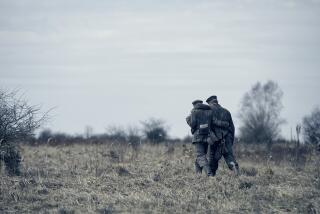MOVIE REVIEW : Post-War East German Myths Revealed in ‘Propaganda’
- Share via
The educational and instructional documentary footage in “Strictly Propaganda” (playing weekends at the Laemmle Monica Theaters) is chillingly funny. Wolfgang Kissel, who currently teaches at the Dresden Visual Arts School, assembled a cross-section of representative documentaries from the archives of DEFA--the official state film studio of the now defunct German Democratic Republic--ranging from the immediate postwar years to the last days of Erich Honecker in 1989.
Kissel makes no attempt to “editorialize.” He doesn’t need to. The fascination of the footage is that, although it presents a sunny, upbeat view of post-war East Germany, the real story can’t help breaking through the enforced joyousness. (It’s as if you were watching two different movies: the one that was made and the one that wasn’t.) The results are beyond satire. You can laugh at a scene like the one where a citizen is encouraged to take his vacation on a steamer cruise up the Volga, or the sequence where an honored party functionary praises Stalin as the prince of peace, but the laughter catches in your craw.
Documentaries are often mistakenly assumed to give us the “truth” but it takes a film like “Strictly Propaganda” to really undercut that bogus idea. It’s difficult to imagine anyone in East Germany falling for much of what we see in this film, and yet, in their own crudely effective way, the DEFA filmmakers knew what they were doing. The repeated shots of blonde children romping and saluting are iconic in a way that is not so very different from the Aryan super-race imagery in Leni Riefenstahl’s “Triumph of the Will.” Only the uniforms, and the salute, are different.
As the years tick by in “Strictly Propaganda,” slight rents in the social fabric emerge. The ‘60s introduced a more “questioning” student into the classroom, and so we’re treated to an instructional documentary for teachers who attempt to defend the party line without alienating the class. There’s also an instructional film for Berlin Wall border guards, including a re-enactment where a West German spy attempting to enter the country is tripped up by failing to recite the opening words of the Communist Manifesto.
It’s an epic stretch from 1946 and the Soviet Occupation Zone to 1989 and the ascendancy of Gorbachev. What’s eerie about “Strictly Propaganda” is that it never acknowledges the stretch. There’s a weightlessness to the footage because it has so little connection to what was going on not only in East Germany, but in the rest of the world. The national portrait that emerges is “The Land That Time Forgot.” Or more accurately, “The Land That Tried to Forget.”
‘Strictly Propaganda’
A First Run Features release. Director Wolfgang Kissel. Executive producer C. Cay Wesnigk. Screenplay by Kissel. Editor Peter Vatter. Running time: 94 minutes.
MPAA rating: Unrated. Times guidelines: shots of post-war destruction and pro-communist propaganda.
More to Read
Only good movies
Get the Indie Focus newsletter, Mark Olsen's weekly guide to the world of cinema.
You may occasionally receive promotional content from the Los Angeles Times.










